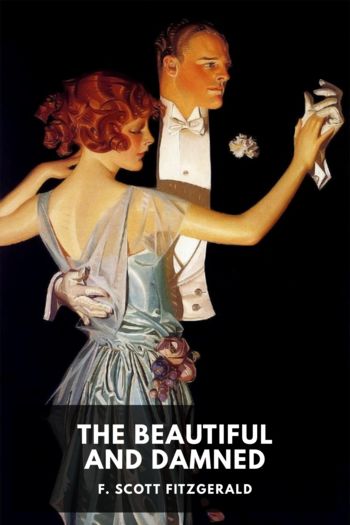The Beautiful and Damned by F. Scott Fitzgerald (best time to read books txt) 📕

- Author: F. Scott Fitzgerald
Book online «The Beautiful and Damned by F. Scott Fitzgerald (best time to read books txt) 📕». Author F. Scott Fitzgerald
Early in the winter, when all conversation turned on the probability of America’s going into the war, when Anthony was making a desperate and sincere attempt to write, Muriel Kane arrived in New York and came immediately to see them. Like Gloria, she seemed never to change. She knew the latest slang, danced the latest dances, and talked of the latest songs and plays with all the fervor of her first season as a New York drifter. Her coyness was eternally new, eternally ineffectual; her clothes were extreme; her black hair was bobbed, now, like Gloria’s.
“I’ve come up for the midwinter prom at New Haven,” she announced, imparting her delightful secret. Though she must have been older then than any of the boys in college, she managed always to secure some sort of invitation, imagining vaguely that at the next party would occur the flirtation which was to end at the romantic altar.
“Where’ve you been?” inquired Anthony, unfailingly amused.
“I’ve been at Hot Springs. It’s been slick and peppy this fall—more men!”
“Are you in love, Muriel?”
“What do you mean ‘love’?” This was the rhetorical question of the year. “I’m going to tell you something,” she said, switching the subject abruptly. “I suppose it’s none of my business, but I think it’s time for you two to settle down.”
“Why, we are settled down.”
“Yes, you are!” she scoffed archly. “Everywhere I go I hear stories of your escapades. Let me tell you, I have an awful time sticking up for you.”
“You needn’t bother,” said Gloria coldly.
“Now, Gloria,” she protested, “you know I’m one of your best friends.”
Gloria was silent. Muriel continued:
“It’s not so much the idea of a woman drinking, but Gloria’s so pretty, and so many people know her by sight all around, that it’s naturally conspicuous—”
“What have you heard recently?” demanded Gloria, her dignity going down before her curiosity.
“Well, for instance, that that party in Marietta killed Anthony’s grandfather.”
Instantly husband and wife were tense with annoyance.
“Why, I think that’s outrageous.”
“That’s what they say,” persisted Muriel stubbornly.
Anthony paced the room. “It’s preposterous!” he declared. “The very people we take on parties shout the story around as a great joke—and eventually it gets back to us in some such form as this.”
Gloria began running her finger through a stray reddish curl. Muriel licked her veil as she considered her next remark.
“You ought to have a baby.”
Gloria looked up wearily.
“We can’t afford it.”
“All the people in the slums have them,” said Muriel triumphantly.
Anthony and Gloria exchanged a smile. They had reached the stage of violent quarrels that were never made up, quarrels that smouldered and broke out again at intervals or died away from sheer indifference—but this visit of Muriel’s drew them temporarily together. When the discomfort under which they were living was remarked upon by a third party, it gave them the impetus to face this hostile world together. It was very seldom, now, that the impulse toward reunion sprang from within.
Anthony found himself associating his own existence with that of the apartment’s night elevator man, a pale, scraggly bearded person of about sixty, with an air of being somewhat above his station. It was probably because of this quality that he had secured the position; it made him a pathetic and memorable figure of failure. Anthony recollected, without humor, a hoary jest about the elevator man’s career being a matter of ups and downs—it was, at any rate, an enclosed life of infinite dreariness. Each time Anthony stepped into the car he waited breathlessly for the old man’s “Well, I guess we’re going to have some sunshine today.” Anthony thought how little rain or sunshine he would enjoy shut into that close little cage in the smoke-colored, windowless hall.
A darkling figure, he attained tragedy in leaving the life that had used him so shabbily. Three young gunmen came in one night, tied him up and left him on a pile of coal in the cellar while they went through the trunk room. When the janitor found him next morning he had collapsed from chill. He died of pneumonia four days later.
He was replaced by a glib Martinique negro, with an incongruous British accent and a tendency to be surly, whom Anthony detested. The passing of the old man had approximately the same effect on him that the kitten story had had on Gloria. He was reminded of the cruelty of all life and, in consequence, of the increasing bitterness of his own.
He was writing—and in earnest at last. He had gone to Dick and listened for a tense hour to an elucidation of those minutiae of procedure which hitherto he had rather scornfully looked down upon. He needed money immediately—he was selling bonds every month to pay their bills. Dick was frank and explicit:
“So far as articles on literary subjects in these obscure magazines go, you couldn’t make enough to pay your rent. Of course if a man has the gift of humor, or a chance at a big biography, or some specialized knowledge, he may strike it rich. But for you, fiction’s the only thing. You say you need money right away?”
“I certainly do.”
“Well, it’d be a year and a half before you’d make any money out of a novel. Try some popular short stories. And, by the way, unless they’re exceptionally brilliant they have to be cheerful and on the side of the heaviest artillery to make you





Comments (0)